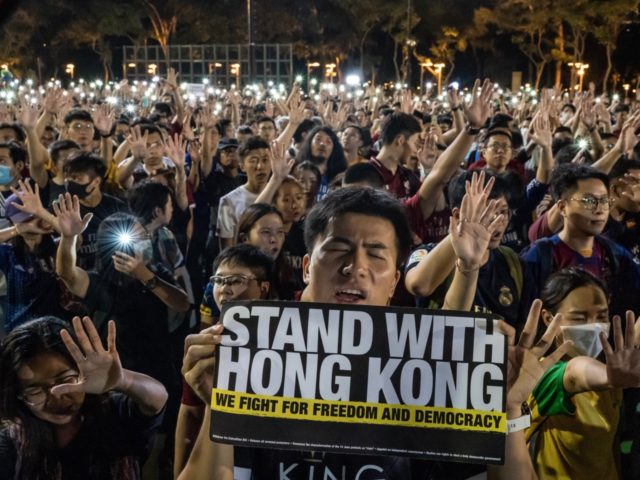China’s foreign ministry called the nomination of the Hong Kong protest movement to the Nobel Peace Prize by a Norwegian lawmaker “foreign interference” and glorification of violence on Friday.
This week, Norwegian lawmaker Gury Melby nominated the Hong Kong pro-democracy demonstrators for the 2020 Noble Peace Prize for their defense of freedom of speech and democracy, arguing that the “importance of what they are doing extends far beyond Hong Kong, both in the region and in the rest of the world.”
Melby’s decision infuriated authorities in Beijing. Foreign Ministry spokesperson Geng Shuang declared that it amounted to a form of foreign interference.
“Hong Kong affairs are China’s internal affairs that allow no interference from foreign governments, organizations or individuals,” Geng told a press conference on Friday. “We urge the relevant person to exercise caution in her words and deeds based on a fair and just attitude, and to stop interfering in Hong Kong affairs and China’s internal affairs.”
The state propaganda outlet Global Times published a typically brazen editorial attacking the nomination, arguing that the “small group of rioters” do not reflect the “people of Hong Kong.”
“But the ‘people of Hong Kong’ refers to whom: The majority of Hongkongers who oppose violence or a small group of rioters? Melby and many others in the West never make this clear,” the editorial read.
“Confusing these two groups is, in fact, advocating violence. And encouraging a “nonviolent” way is actually an attempt to cover up their motives,” it continued. “With their encouragement and instigation, the rioters in Hong Kong will only become increasingly rampant.”
Hong Kong has been rocked by massive protests since June after the city’s China-controlled legislature proposed a bill that would have given China the power to extradite its citizens to China.
Hong Kong Chief Executive Carrie Lam has since pledged to scrap the bill. Protesters listed the bill as one of five core demands to their government and have not stopped taking the streets.
In a scathing editorial, Global Times writer Sia Tian went on to argue how it was completely “absurd” to nominate the protesters for a peace award, given the alleged havoc they have wreaked on the city. The writer fails to mention the overwhelming amount of violence perpetrated at protests has been by either police forces or pro-China criminal mobs:
Four months ago, Hong Kong was a stable city with a booming market economy and a good connection with the Chinese mainland. Citizens could walk along the streets with ease. However, what is the city like now? Didn’t the violent protesters throw the city into chaos and place ordinary citizens on tenterhooks?
A group, which has turned a stable and peaceful region upside down, was nominated to a peace prize and gained widely support from the Western community. It is completely absurd. If this is how a “peace” prize works, many anti-government forces and violent demonstrators in the Western world should also be regarded as honored guests at the award ceremony. But why do they receive warrants of arrest instead of invitation letters in the West?
It is not the first time that Hong Kong’s pro-democracy movement has been nominated for the Nobel Peace Prize. Last year, a bipartisan group of U.S. lawmakers nominated activists Joshua Wong, Nathan Law, and Alex Chow for the award, arguing that they had “demonstrated civic courage, extraordinary leadership, and an unwavering commitment to a free and prosperous Hong Kong that upholds the rule of law, political freedoms, and human rights.”
They lost out to Congolese gynecologist Dr. Denis Mukwege and former Yazidi Islamic State captive Nadia Murad for their contributions toward combating wartime sexual violence.
Follow Ben Kew on Facebook, Twitter at @ben_kew, or email him at bkew@breitbart.com.

COMMENTS
Please let us know if you're having issues with commenting.